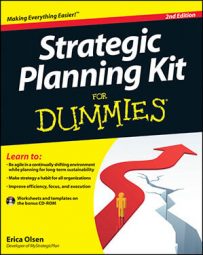Acting as a coach, you can use the strategic plan as your framework to guide your team to high performance. Think about your favorite Olympic athlete. Do you think the athlete’s goal is foremost on her mind every day? You bet it is. That’s why you and your manager must act as coaches to get Olympic-level performances out of all your people.
Susan Scott, author of Fierce Conversations: Achieving Success at Work and in Life, One Conversation at a Time (Berkley Trade), suggests we shift our thinking to “Holding people able.” In addition to focusing on the goal, Olympic athletes are incredibly disciplined. Implementing goals that were set months ago is no different. It requires that same level of commitment and discipline.
Here’s where you and your managers need to lead rather than fight fires and do detail work. Just like an athletic coach, you need to do the following to motivate and guide your team:
Encourage: People need to feel like they’re doing a good job and are appreciated for their hard work. Coaches say encouraging words to their team members to keep them motivated and engaged.
Support: Without the right skills and resources, no amount of prodding and pushing will get the job done. Coaches support their team by making sure it has the training, knowledge, and ability to complete the task.
Yell at the right time: Just like athletic coaches know when to yell, managers need to know when to push their team. A good coach knows when performance is lagging and when to turn on the pressure.
Bring out the best: Seeing the strengths and weaknesses of your team allows you to bring out the best in your staff. Coaches know how to make people the best they can be.
Monitor performance: Keeping track of how everyone is performing is another trait of a good coach. With your SMART goals, you can assist your employees in creating an action plan (if it isn’t already established) and keep them on the path toward achieving it. Meet with employees regularly to discuss the status of goal accomplishment.
Coach your team through setbacks or roadblocks. Coach your team for success by recognizing and rewarding employees for achievements.

